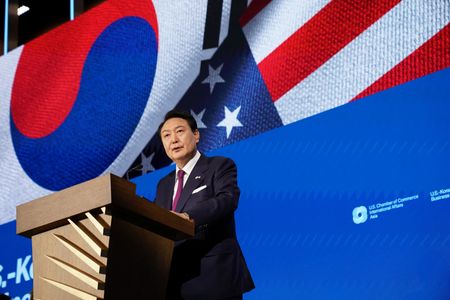 1
1 1
1
By David Brunnstrom
WASHINGTON (Reuters) – At a summit with South Korean leader Yoon Suk Yeol on Wednesday, U.S. President Joe Biden will seek to reassure South Koreans that the U.S. nuclear umbrella is sufficient protection from North Korean attack.
But with North Korean missiles now a direct threat to the United States, an old Cold-War dilemma has resurfaced: would the United States risk nuclear retaliation against itself to defend an ally?
WHY IS SOUTH KOREA WORRIED?
U.S. “extended deterrence” protection for South Korea rests on a simple, if grim, assumption: if North Korea were to attack South Korea with nuclear weapons, it would face devastating U.S. retaliatory strikes.
For years after Pyongyang first tested a nuclear bomb in 2006 this was a believable threat – North Korea had relatively few bombs and limited ability to send them far beyond its own borders.
But its arsenal has grown and it now has intercontinental ballistic missiles (ICBMs) that can reach U.S. cities, making the cost of defending South Korea potentially far higher.
Skeptical that the United States would really risk its own cities to defend its ally – the more so after former President Donald Trump questioned the value of the South Korean alliance when he was in office – many South Koreans now support the idea of their country developing its own nuclear weapons.
A poll last month found over 64% of South Koreans support this, something the Biden administration is set against.
WHAT ARE SOUTH KOREA’S OPTIONS?
Yoon vowed in his election campaign to seek redeployment of U.S. tactical nuclear weapons in South Korea and possibly “nuclear sharing,” meaning joint command over U.S. weapons. In January, he raised the possibility that Seoul might someday need to develop its own nuclear arsenal, saying it could do this quickly given its scientific expertise.
Yoon never pursued redeployment of tactical nuclear weapons, which Washington said it would not support, and walked back his comments on a South Korean bomb, saying his administration was committed to the nuclear non-proliferation treaty (NPT).
But his comments have driven a growing debate that one former senior U.S. defense official said threatens to normalize a once unthinkable concept of a South Korean nuclear arsenal.
WHAT TO EXPECT FROM THE BIDEN-YOON SUMMIT
To counter such sentiment, Biden will pledge what senior U.S. officials say will be “substantial” steps to strengthen extended deterrence. A “Washington Declaration” will include creation of a “Nuclear Consultative Group” to give South Korea additional insight on U.S. planning for major contingencies and “a voice in those deliberations,” one official said.
The aim was to make clear “our absolute and enduring commitment to provide extended deterrence to (South Korea), including, as necessary, a decisive response,” another said.
The leaders will announce plans to make deterrence more visible through regular deployments of strategic assets, including a first U.S. nuclear ballistic-missile submarine visit to South Korea since the early 1980s.
However, the officials stressed there was “no vision” of returning U.S. nuclear weapons to the Korean peninsula and that decisions on their use was the sole authority of U.S. president, while Seoul would reaffirm its commitment to the NPT and its non-nuclear status.
WHAT WOULD BE THE IMPLICATIONS OF A NUCLEAR SOUTH KOREA?
Nuclear expert Siegfried Hecker warned in January there could be disastrous downsides to Seoul acquiring its own bomb, spurring North Korea to build an even bigger arsenal and likely triggering highly damaging sanctions on South Korea’s economy.
Despite South Korea’s technical expertise and civilian nuclear program, creating a nuclear arsenal would take years and could spell the end of its U.S. alliance and the protection of the U.S. nuclear umbrella, he wrote.
It would also threaten worldwide non-proliferation efforts.
“South Korea would be the first democratic country to withdraw from the NPT, dealing a blow to decades of U.S. leadership in preventing nuclear proliferation,” Hecker said. “Washington would have no choice but to condemn and counter the South’s decision to build the bomb.”
“The South can have its own nuclear arsenal — at great expense and sacrifice — or work with the Americans to remain under the nuclear umbrella with American troops stationed on the peninsula. It cannot have both.”
(Reporting by David Brunnstrom in Washington; additional reporting by Josh Smith, Soo-hyang Choi and Ju-min Park in Seoul; Editing by Don Durfee and Michael Perry)